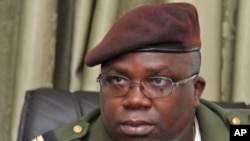Guinea-Bissau's military junta says it would not accept the presence of U.N. peacekeeping troops in the country, rejecting a proposal from the ousted ruling party.
A spokesman for the junta, Daba Na Walna, told reporters Friday that Guinea-Bissau does not need peacekeepers because the country is not at war. He said any foreign troops sent to the country would be considered an invasion force.
Thursday, the foreign minister of the ousted government called on the United Nations Security Council to authorize the deployment of peacekeepers. Mamadu Saliu Djalo said the force would stay until civilian rule is re-established, following last week's military coup.
ECOWAS
But diplomats say the Security Council would prefer Guinea-Bissau exhaust mediation efforts by the African Union and West African bloc ECOWAS before authorizing a stabilization mission.
ECOWAS has called an emergency summit to be held next week to discuss restoration of constitutional order in Guinea Bissau. The group is also expected to discuss Mali, where a coup took place last month.
ECOWAS has condemned the plans by Guinea Bissau's military to organize elections in two years, charging that the junta reneged on a previous understanding to immediately restore democracy in the country.
Transitional leader
On Thursday, the military junta named a former Guinea-Bissau presidential candidate to head the proposed two-year transitional government, defying international calls to turn the government back to elected officials.
Manuel Serifo Nhamadjo was selected by the military and a group of opposition parties to head the interim government.
Guinea-Bissau's ruling party did not take part in the selection process and rejected a power deal reached by the military junta and the group of opposition parties.
The junta continues to hold Interim President Raimundo Pereira and leading presidential candidate Carlos Gomes, Jr. Soldiers arrested the two officials after the April 12 coup. The junta has not given a reason for their detention.
Run-off election
The coup took place as presidential candidates were set to begin campaigning for a run-off election that was to be held on April 29.
Gomes won the first round of voting and appeared to have a comfortable lead in the run-off against former president Kumba Yala, who has strong ties to the military.
Guinea-Bissau was electing a new president to replace President Malam Bacai Sanha, who died in January after a long illness.




